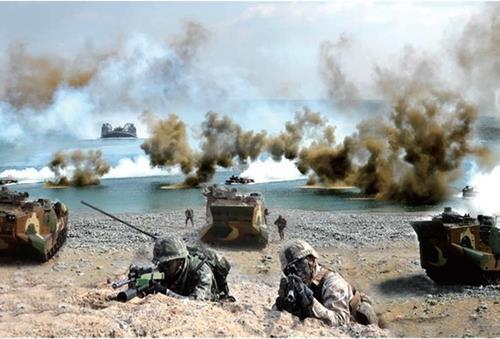As South Korea mulls reducing or skipping joint military drills with the US in August, experts warn that suspending the biannual exercises would do little to bring about a lasting detente with North Korea.
Seoul and Washington have held the drills since the 1953 Korean War armistice to ensure readiness against Pyongyang’s aggression. But since 2019, some drills have been skipped while others were scaled down because of the COVID-19 pandemic.
This time, the Moon Jae-in government wants to hold smaller drills to engage Pyongyang, whose leader, Kim Jong-un, said last week that his country should be ready for both talks and confrontation. Kim has called on Seoul and Washington to drop the drills he describes as hostile policy for dialogue to take place.
“I think we’re in perfect agreement. We will also meet with North Korea ‘anytime, anywhere, without preconditions,’” Unification Minister Lee In-young said Tuesday, quoting Sung Kim, the US special representative for North Korea, who responded to Kim Jong-un by saying the US was likewise ready to engage.
The US envoy is visiting Seoul to meet with his South Korean and Japanese counterparts to discuss Biden’s new “practical policy” on North Korea, which seeks to explore diplomacy with the regime and make progress on the denuclearization front.
But experts warn against using the drills as a bargaining chip, saying that Seoul cannot expect a lasting inter-Korean detente from last-minute engagement.
“Let’s look back. We haven’t seen any progress on denuclearization but Kim has built improved weaponry. So why keep going down that road again and again?” said Shin Beom-chul, director of the Center for Diplomacy and Security at the Korea Research Institute for National Strategy.
Seoul and Washington have held computer war games rather than all-out field exercises since 2019, a year after former US President Donald Trump ordered the suspension of field drills in exchange for Pyongyang’s denuclearization. Kim has since said he will expand nuclear technologies.
Shin cautioned against a rosy outlook for any talks that might follow from suspending the August drills.
“Even if talks were to take place, would he be really serious about committing himself to any deal made there? Kim has just learned he could kill the decadeslong practice -- the drills -- that easily,” Shin asked.
Military experts said the repercussions from making changes to the drills just to make room for talks would leave South Korea always seeking to sacrifice something greater than necessary.
“This is a pattern. It’s drills for talks this time and the next time? Stop bringing in US-made weapons here? This is a dangerous precedent that could stick if we’re sloppy,” said Moon Seong-mook, chief of the Unification Strategy Center at the Korea Research Institute for National Strategy.
Moon, a former one-star Army general who served as chief negotiator at the inter-Korean military talks in 2007, was referring to North Korea’s party congress in January where Kim Jong-un demanded South Korea stop holding the drills and importing high-tech US-made weapons.
Some said Seoul should look for less contentious approaches to revive talks if it really wants them.
“The drills affect our readiness and we can’t just write them off. Are we 100 percent sure we haven’t looked at every other diplomatic tool that could bring North Koreans to dialogue?” posed Hong Min, director of the North Korean division at the Korea Institute for National Unification.
The US might not be fully on board with skipping or reducing drills. In that case Seoul could risk widening a rift with Washington over engaging Pyongyang, though the Biden administration would try listening to what Moon has to say, Hong noted.
Shin Jong-woo, a senior analyst at the Korea Defense and Security Forum, said the Moon government is just wrong to assume that Kim Jong-un is leaning on talks.
“He said ‘talks and confrontation’ and we choose to forget the last part?” Shin said. “I don’t see the Moon government triggering a last-minute breakthrough in inter-Korean ties.”
The two Koreas, which enjoyed a short-lived detente following the 2018 summit, have yet to talk to each other since North Korea destroyed an inter-Korean liaison office in its territory last year. Moon leaves office in May next year.
By Choi Si-young (
siyoungchoi@heraldcorp.com)





![[Exclusive] Hyundai Mobis eyes closer ties with BYD](http://res.heraldm.com/phpwas/restmb_idxmake.php?idx=644&simg=/content/image/2024/11/25/20241125050044_0.jpg)
![[Herald Review] 'Gangnam B-Side' combines social realism with masterful suspense, performance](http://res.heraldm.com/phpwas/restmb_idxmake.php?idx=644&simg=/content/image/2024/11/25/20241125050072_0.jpg)

